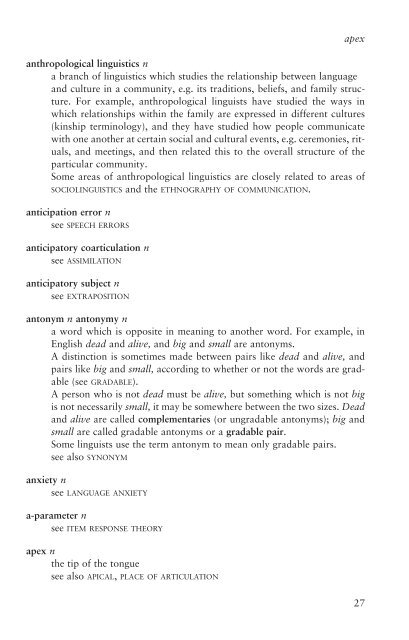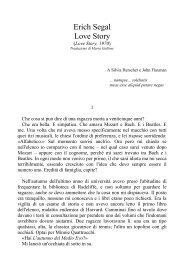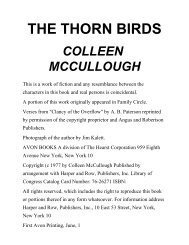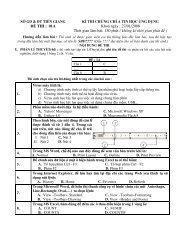- Page 2 and 3: PE2379 pr.qxd 24/1/02 16:02 Page i
- Page 4 and 5: PE2379 pr.qxd 24/1/02 16:02 Page ii
- Page 6 and 7: PE2379 pr.qxd 24/1/02 16:02 Page v
- Page 8 and 9: PE2379 pr.qxd 24/1/02 16:02 Page vi
- Page 10 and 11: PE2379 pr.qxd 24/1/02 16:02 Page ix
- Page 12 and 13: PE2379 ch01.qxd 24/1/02 16:03 Page
- Page 14 and 15: PE2379 ch01.qxd 24/1/02 16:03 Page
- Page 16 and 17: PE2379 ch01.qxd 24/1/02 16:03 Page
- Page 18 and 19: PE2379 ch01.qxd 24/1/02 16:03 Page
- Page 20 and 21: PE2379 ch01.qxd 24/1/02 16:03 Page
- Page 22 and 23: PE2379 ch01.qxd 24/1/02 16:03 Page
- Page 24 and 25: PE2379 ch01.qxd 24/1/02 16:03 Page
- Page 26 and 27: PE2379 ch01.qxd 24/1/02 16:03 Page
- Page 28 and 29: PE2379 ch01.qxd 24/1/02 16:03 Page
- Page 30 and 31: PE2379 ch01.qxd 24/1/02 16:03 Page
- Page 32 and 33: PE2379 ch01.qxd 24/1/02 16:03 Page
- Page 34 and 35: PE2379 ch01.qxd 24/1/02 16:03 Page
- Page 36 and 37: PE2379 ch01.qxd 24/1/02 16:03 Page
- Page 40 and 41: PE2379 ch01.qxd 24/1/02 16:03 Page
- Page 42 and 43: PE2379 ch01.qxd 24/1/02 16:03 Page
- Page 44 and 45: PE2379 ch01.qxd 24/1/02 16:03 Page
- Page 46 and 47: PE2379 ch01.qxd 24/1/02 16:03 Page
- Page 48 and 49: PE2379 ch01.qxd 24/1/02 16:03 Page
- Page 50 and 51: PE2379 ch01.qxd 24/1/02 16:03 Page
- Page 52 and 53: PE2379 ch01.qxd 24/1/02 16:03 Page
- Page 54 and 55: PE2379 ch01.qxd 24/1/02 16:03 Page
- Page 56 and 57: PE2379 ch02.qxd 24/1/02 16:04 Page
- Page 58 and 59: PE2379 ch02.qxd 24/1/02 16:04 Page
- Page 60 and 61: PE2379 ch02.qxd 24/1/02 16:04 Page
- Page 62 and 63: PE2379 ch02.qxd 24/1/02 16:04 Page
- Page 64 and 65: PE2379 ch02.qxd 24/1/02 16:04 Page
- Page 66 and 67: PE2379 ch02.qxd 24/1/02 16:04 Page
- Page 68 and 69: PE2379 ch02.qxd 24/1/02 16:04 Page
- Page 70 and 71: PE2379 ch02.qxd 24/1/02 16:04 Page
- Page 72 and 73: PE2379 ch02.qxd 24/1/02 16:04 Page
- Page 74 and 75: PE2379 ch02.qxd 24/1/02 16:04 Page
- Page 76 and 77: PE2379 ch02.qxd 24/1/02 16:04 Page
- Page 78 and 79: PE2379 ch02.qxd 24/1/02 16:04 Page
- Page 80 and 81: PE2379 ch02.qxd 24/1/02 16:04 Page
- Page 82 and 83: PE2379 ch02.qxd 24/1/02 16:04 Page
- Page 84 and 85: PE2379 ch02.qxd 24/1/02 16:04 Page
- Page 86 and 87: PE2379 ch02.qxd 24/1/02 16:04 Page
- Page 88 and 89:
PE2379 ch02.qxd 24/1/02 16:04 Page
- Page 90 and 91:
PE2379 ch02.qxd 24/1/02 16:04 Page
- Page 92 and 93:
PE2379 ch02.qxd 24/1/02 16:04 Page
- Page 94 and 95:
PE2379 ch02.qxd 24/1/02 16:04 Page
- Page 96 and 97:
PE2379 ch02.qxd 24/1/02 16:04 Page
- Page 98 and 99:
PE2379 ch02.qxd 24/1/02 16:04 Page
- Page 100 and 101:
PE2379 ch02.qxd 24/1/02 16:04 Page
- Page 102 and 103:
PE2379 ch02.qxd 24/1/02 16:04 Page
- Page 104 and 105:
PE2379 ch02.qxd 24/1/02 16:04 Page
- Page 106 and 107:
PE2379 ch02.qxd 24/1/02 16:04 Page
- Page 108 and 109:
PE2379 ch02.qxd 24/1/02 16:04 Page
- Page 110 and 111:
PE2379 ch02.qxd 24/1/02 16:04 Page
- Page 112 and 113:
PE2379 ch02.qxd 24/1/02 16:04 Page
- Page 114 and 115:
PE2379 ch02.qxd 24/1/02 16:04 Page
- Page 116 and 117:
PE2379 ch02.qxd 24/1/02 16:04 Page
- Page 118 and 119:
PE2379 ch02.qxd 24/1/02 16:04 Page
- Page 120 and 121:
PE2379 ch02.qxd 24/1/02 16:04 Page
- Page 122 and 123:
PE2379 ch02.qxd 24/1/02 16:04 Page
- Page 124 and 125:
PE2379 ch02.qxd 24/1/02 16:04 Page
- Page 126 and 127:
PE2379 ch02.qxd 24/1/02 16:04 Page
- Page 128 and 129:
PE2379 ch02.qxd 24/1/02 16:04 Page
- Page 130 and 131:
PE2379 ch02.qxd 24/1/02 16:04 Page
- Page 132 and 133:
PE2379 ch02.qxd 24/1/02 16:04 Page
- Page 134 and 135:
PE2379 ch02.qxd 24/1/02 16:04 Page
- Page 136 and 137:
PE2379 ch02.qxd 24/1/02 16:04 Page
- Page 138 and 139:
PE2379 ch02.qxd 24/1/02 16:04 Page
- Page 140 and 141:
PE2379 ch02.qxd 24/1/02 16:04 Page
- Page 142 and 143:
PE2379 ch02.qxd 24/1/02 16:04 Page
- Page 144 and 145:
PE2379 ch02.qxd 24/1/02 16:04 Page
- Page 146 and 147:
PE2379 ch02.qxd 24/1/02 16:04 Page
- Page 148 and 149:
PE2379 ch02.qxd 24/1/02 16:04 Page
- Page 150 and 151:
PE2379 ch02.qxd 24/1/02 16:04 Page
- Page 152 and 153:
PE2379 ch02.qxd 24/1/02 16:04 Page
- Page 154 and 155:
PE2379 ch03.qxd 24/1/02 16:05 Page
- Page 156 and 157:
PE2379 ch03.qxd 24/1/02 16:05 Page
- Page 158 and 159:
PE2379 ch03.qxd 24/1/02 16:05 Page
- Page 160 and 161:
PE2379 ch03.qxd 24/1/02 16:05 Page
- Page 162 and 163:
PE2379 ch03.qxd 24/1/02 16:05 Page
- Page 164 and 165:
PE2379 ch03.qxd 24/1/02 16:05 Page
- Page 166 and 167:
PE2379 ch03.qxd 24/1/02 16:05 Page
- Page 168 and 169:
PE2379 ch03.qxd 24/1/02 16:05 Page
- Page 170 and 171:
PE2379 ch03.qxd 24/1/02 16:05 Page
- Page 172 and 173:
PE2379 ch03.qxd 24/1/02 16:05 Page
- Page 174 and 175:
PE2379 ch03.qxd 24/1/02 16:05 Page
- Page 176 and 177:
PE2379 ch03.qxd 24/1/02 16:05 Page
- Page 178 and 179:
PE2379 ch03.qxd 24/1/02 16:05 Page
- Page 180 and 181:
PE2379 ch03.qxd 24/1/02 16:05 Page
- Page 182 and 183:
PE2379 ch03.qxd 24/1/02 16:05 Page
- Page 184 and 185:
PE2379 ch03.qxd 24/1/02 16:05 Page
- Page 186 and 187:
PE2379 ch03.qxd 24/1/02 16:05 Page
- Page 188 and 189:
PE2379 ch03.qxd 24/1/02 16:05 Page
- Page 190 and 191:
PE2379 ch03.qxd 24/1/02 16:05 Page
- Page 192 and 193:
PE2379 ch03.qxd 24/1/02 16:05 Page
- Page 194 and 195:
PE2379 ch03.qxd 24/1/02 16:05 Page
- Page 196 and 197:
PE2379 ch03.qxd 24/1/02 16:05 Page
- Page 198 and 199:
PE2379 ch03.qxd 24/1/02 16:05 Page
- Page 200 and 201:
PE2379 ch03.qxd 24/1/02 16:05 Page
- Page 202 and 203:
PE2379 ch03.qxd 24/1/02 16:05 Page
- Page 204 and 205:
PE2379 ch03.qxd 24/1/02 16:05 Page
- Page 206 and 207:
PE2379 ch03.qxd 24/1/02 16:05 Page
- Page 208 and 209:
PE2379 ch03.qxd 24/1/02 16:05 Page
- Page 210 and 211:
PE2379 ch03.qxd 24/1/02 16:05 Page
- Page 212 and 213:
PE2379 ch03.qxd 24/1/02 16:05 Page
- Page 214 and 215:
PE2379 ch03.qxd 24/1/02 16:05 Page
- Page 216 and 217:
PE2379 ch03.qxd 24/1/02 16:05 Page
- Page 218 and 219:
PE2379 ch03.qxd 24/1/02 16:05 Page
- Page 220 and 221:
PE2379 ch03.qxd 24/1/02 16:05 Page
- Page 222 and 223:
PE2379 ch03.qxd 24/1/02 16:05 Page
- Page 224 and 225:
PE2379 ch03.qxd 24/1/02 16:05 Page
- Page 226 and 227:
PE2379 ch03.qxd 24/1/02 16:05 Page
- Page 228 and 229:
PE2379 ch03.qxd 24/1/02 16:05 Page
- Page 230 and 231:
PE2379 ch03.qxd 24/1/02 16:05 Page
- Page 232 and 233:
PE2379 ch03.qxd 24/1/02 16:05 Page
- Page 234 and 235:
PE2379 ch03.qxd 24/1/02 16:05 Page
- Page 236 and 237:
PE2379 ch03.qxd 24/1/02 16:05 Page
- Page 238 and 239:
PE2379 ch03.qxd 24/1/02 16:05 Page
- Page 240 and 241:
PE2379 ch03.qxd 24/1/02 16:05 Page
- Page 242 and 243:
PE2379 ch03.qxd 24/1/02 16:05 Page
- Page 244 and 245:
PE2379 ch03.qxd 24/1/02 16:05 Page
- Page 246 and 247:
PE2379 ch03.qxd 24/1/02 16:05 Page
- Page 248 and 249:
PE2379 ch04.qxd 24/1/02 16:05 Page
- Page 250 and 251:
PE2379 ch04.qxd 24/1/02 16:05 Page
- Page 252 and 253:
PE2379 ch04.qxd 24/1/02 16:05 Page
- Page 254 and 255:
PE2379 ch04.qxd 24/1/02 16:05 Page
- Page 256 and 257:
PE2379 ch04.qxd 24/1/02 16:05 Page
- Page 258 and 259:
PE2379 ch04.qxd 24/1/02 16:05 Page
- Page 260 and 261:
PE2379 ch04.qxd 24/1/02 16:05 Page
- Page 262 and 263:
PE2379 ch04.qxd 24/1/02 16:05 Page
- Page 264 and 265:
PE2379 ch04.qxd 24/1/02 16:05 Page
- Page 266 and 267:
PE2379 ch04.qxd 24/1/02 16:05 Page
- Page 268 and 269:
PE2379 ch04.qxd 24/1/02 16:05 Page
- Page 270 and 271:
PE2379 ch04.qxd 24/1/02 16:05 Page
- Page 272 and 273:
PE2379 ch04.qxd 24/1/02 16:05 Page
- Page 274 and 275:
PE2379 ch04.qxd 24/1/02 16:05 Page
- Page 276 and 277:
PE2379 ch04.qxd 24/1/02 16:05 Page
- Page 278 and 279:
PE2379 ch04.qxd 24/1/02 16:05 Page
- Page 280 and 281:
PE2379 ch04.qxd 24/1/02 16:05 Page
- Page 282 and 283:
PE2379 ch04.qxd 24/1/02 16:05 Page
- Page 284 and 285:
PE2379 ch04.qxd 24/1/02 16:05 Page
- Page 286 and 287:
PE2379 ch04.qxd 24/1/02 16:05 Page
- Page 288 and 289:
PE2379 ch04.qxd 24/1/02 16:05 Page
- Page 290 and 291:
PE2379 ch04.qxd 24/1/02 16:05 Page
- Page 292 and 293:
PE2379 ch04.qxd 24/1/02 16:05 Page
- Page 294 and 295:
PE2379 ch04.qxd 24/1/02 16:05 Page
- Page 296 and 297:
PE2379 ch04.qxd 24/1/02 16:05 Page
- Page 298 and 299:
PE2379 ch04.qxd 24/1/02 16:05 Page
- Page 300 and 301:
PE2379 ch04.qxd 24/1/02 16:05 Page
- Page 302 and 303:
PE2379 ch04.qxd 24/1/02 16:05 Page
- Page 304 and 305:
PE2379 ch04.qxd 24/1/02 16:05 Page
- Page 306 and 307:
PE2379 ch04.qxd 24/1/02 16:05 Page
- Page 308 and 309:
PE2379 ch04.qxd 24/1/02 16:05 Page
- Page 310 and 311:
PE2379 ch04.qxd 24/1/02 16:05 Page
- Page 312 and 313:
PE2379 ch04.qxd 24/1/02 16:05 Page
- Page 314 and 315:
PE2379 ch04.qxd 24/1/02 16:05 Page
- Page 316 and 317:
PE2379 ch04.qxd 24/1/02 16:05 Page
- Page 318 and 319:
PE2379 ch04.qxd 24/1/02 16:05 Page
- Page 320 and 321:
PE2379 ch04.qxd 24/1/02 16:05 Page
- Page 322 and 323:
PE2379 ch04.qxd 24/1/02 16:05 Page
- Page 324 and 325:
PE2379 ch04.qxd 24/1/02 16:05 Page
- Page 326 and 327:
PE2379 ch04.qxd 24/1/02 16:05 Page
- Page 328 and 329:
PE2379 ch04.qxd 24/1/02 16:06 Page
- Page 330 and 331:
PE2379 ch04.qxd 24/1/02 16:06 Page
- Page 332 and 333:
PE2379 ch04.qxd 24/1/02 16:06 Page
- Page 334 and 335:
PE2379 ch04.qxd 24/1/02 16:06 Page
- Page 336 and 337:
PE2379 ch04.qxd 24/1/02 16:06 Page
- Page 338 and 339:
PE2379 ch04.qxd 24/1/02 16:06 Page
- Page 340 and 341:
PE2379 ch04.qxd 24/1/02 16:06 Page
- Page 342 and 343:
PE2379 ch04.qxd 24/1/02 16:06 Page
- Page 344 and 345:
PE2379 ch04.qxd 24/1/02 16:06 Page
- Page 346 and 347:
PE2379 ch04.qxd 24/1/02 16:06 Page
- Page 348 and 349:
PE2379 ch04.qxd 24/1/02 16:06 Page
- Page 350 and 351:
PE2379 ch04.qxd 24/1/02 16:06 Page
- Page 352 and 353:
PE2379 ch04.qxd 24/1/02 16:06 Page
- Page 354 and 355:
PE2379 ch04.qxd 24/1/02 16:06 Page
- Page 356 and 357:
PE2379 ch04.qxd 24/1/02 16:06 Page
- Page 358 and 359:
PE2379 ch04.qxd 24/1/02 16:06 Page
- Page 360 and 361:
PE2379 ch05.qxd 24/1/02 16:06 Page
- Page 362 and 363:
PE2379 ch05.qxd 24/1/02 16:06 Page
- Page 364 and 365:
PE2379 ch05.qxd 24/1/02 16:06 Page
- Page 366 and 367:
PE2379 ch05.qxd 24/1/02 16:06 Page
- Page 368 and 369:
PE2379 ch05.qxd 24/1/02 16:06 Page
- Page 370 and 371:
PE2379 ch05.qxd 24/1/02 16:06 Page
- Page 372 and 373:
PE2379 ch05.qxd 24/1/02 16:06 Page
- Page 374 and 375:
PE2379 ch05.qxd 24/1/02 16:06 Page
- Page 376 and 377:
PE2379 ch05.qxd 24/1/02 16:06 Page
- Page 378 and 379:
PE2379 ch05.qxd 24/1/02 16:06 Page
- Page 380 and 381:
PE2379 ch05.qxd 24/1/02 16:06 Page
- Page 382 and 383:
PE2379 ch05.qxd 24/1/02 16:06 Page
- Page 384 and 385:
PE2379 ch05.qxd 24/1/02 16:06 Page
- Page 386 and 387:
PE2379 ch05.qxd 24/1/02 16:06 Page
- Page 388 and 389:
PE2379 ch05.qxd 24/1/02 16:06 Page
- Page 390 and 391:
PE2379 ch05.qxd 24/1/02 16:06 Page
- Page 392 and 393:
PE2379 ch05.qxd 24/1/02 16:06 Page
- Page 394 and 395:
PE2379 ch05.qxd 24/1/02 16:06 Page
- Page 396 and 397:
PE2379 ch05.qxd 24/1/02 16:06 Page
- Page 398 and 399:
PE2379 ch05.qxd 24/1/02 16:06 Page
- Page 400 and 401:
PE2379 ch05.qxd 24/1/02 16:06 Page
- Page 402 and 403:
PE2379 ch05.qxd 24/1/02 16:06 Page
- Page 404 and 405:
PE2379 ch05.qxd 24/1/02 16:06 Page
- Page 406 and 407:
PE2379 ch05.qxd 24/1/02 16:06 Page
- Page 408 and 409:
PE2379 ch05.qxd 24/1/02 16:06 Page
- Page 410 and 411:
PE2379 ch05.qxd 24/1/02 16:06 Page
- Page 412 and 413:
PE2379 ch05.qxd 24/1/02 16:06 Page
- Page 414 and 415:
PE2379 ch05.qxd 24/1/02 16:06 Page
- Page 416 and 417:
PE2379 ch05.qxd 24/1/02 16:06 Page
- Page 418 and 419:
PE2379 ch05.qxd 24/1/02 16:06 Page
- Page 420 and 421:
PE2379 ch05.qxd 24/1/02 16:06 Page
- Page 422 and 423:
PE2379 ch05.qxd 24/1/02 16:06 Page
- Page 424 and 425:
PE2379 ch05.qxd 24/1/02 16:06 Page
- Page 426 and 427:
PE2379 ch05.qxd 24/1/02 16:06 Page
- Page 428 and 429:
PE2379 ch05.qxd 24/1/02 16:06 Page
- Page 430 and 431:
PE2379 ch05.qxd 24/1/02 16:06 Page
- Page 432 and 433:
PE2379 ch05.qxd 24/1/02 16:06 Page
- Page 434 and 435:
PE2379 ch05.qxd 24/1/02 16:06 Page
- Page 436 and 437:
PE2379 ch05.qxd 24/1/02 16:06 Page
- Page 438 and 439:
PE2379 ch05.qxd 24/1/02 16:06 Page
- Page 440 and 441:
PE2379 ch05.qxd 24/1/02 16:06 Page
- Page 442 and 443:
PE2379 ch05.qxd 24/1/02 16:06 Page
- Page 444 and 445:
PE2379 ch05.qxd 24/1/02 16:06 Page
- Page 446 and 447:
PE2379 ch06.qxd 24/1/02 16:07 Page
- Page 448 and 449:
PE2379 ch06.qxd 24/1/02 16:07 Page
- Page 450 and 451:
PE2379 ch06.qxd 24/1/02 16:07 Page
- Page 452 and 453:
PE2379 ch06.qxd 24/1/02 16:07 Page
- Page 454 and 455:
PE2379 ch06.qxd 24/1/02 16:07 Page
- Page 456 and 457:
PE2379 ch06.qxd 24/1/02 16:07 Page
- Page 458 and 459:
PE2379 ch06.qxd 24/1/02 16:07 Page
- Page 460 and 461:
PE2379 ch06.qxd 24/1/02 16:07 Page
- Page 462 and 463:
PE2379 ch06.qxd 24/1/02 16:07 Page
- Page 464 and 465:
PE2379 ch06.qxd 24/1/02 16:07 Page
- Page 466 and 467:
PE2379 ch06.qxd 24/1/02 16:07 Page
- Page 468 and 469:
PE2379 ch06.qxd 24/1/02 16:07 Page
- Page 470 and 471:
PE2379 ch06.qxd 24/1/02 16:07 Page
- Page 472 and 473:
PE2379 ch06.qxd 24/1/02 16:07 Page
- Page 474 and 475:
PE2379 ch06.qxd 24/1/02 16:07 Page
- Page 476 and 477:
PE2379 ch06.qxd 24/1/02 16:07 Page
- Page 478 and 479:
PE2379 ch06.qxd 24/1/02 16:07 Page
- Page 480 and 481:
PE2379 ch06.qxd 24/1/02 16:07 Page
- Page 482 and 483:
PE2379 ch06.qxd 24/1/02 16:07 Page
- Page 484 and 485:
PE2379 ch06.qxd 24/1/02 16:07 Page
- Page 486 and 487:
PE2379 ch06.qxd 24/1/02 16:07 Page
- Page 488 and 489:
PE2379 ch06.qxd 24/1/02 16:07 Page
- Page 490 and 491:
PE2379 ch06.qxd 24/1/02 16:07 Page
- Page 492 and 493:
PE2379 ch06.qxd 24/1/02 16:07 Page
- Page 494 and 495:
PE2379 ch06.qxd 24/1/02 16:07 Page
- Page 496 and 497:
PE2379 ch06.qxd 24/1/02 16:07 Page
- Page 498 and 499:
PE2379 ch06.qxd 24/1/02 16:07 Page
- Page 500 and 501:
PE2379 ch06.qxd 24/1/02 16:07 Page
- Page 502 and 503:
PE2379 ch06.qxd 24/1/02 16:07 Page
- Page 504 and 505:
PE2379 ch06.qxd 24/1/02 16:07 Page
- Page 506 and 507:
PE2379 ch06.qxd 24/1/02 16:07 Page
- Page 508 and 509:
PE2379 ch06.qxd 24/1/02 16:07 Page
- Page 510 and 511:
PE2379 ch06.qxd 24/1/02 16:07 Page
- Page 512 and 513:
PE2379 ch06.qxd 24/1/02 16:07 Page
- Page 514 and 515:
PE2379 ch06.qxd 24/1/02 16:07 Page
- Page 516 and 517:
PE2379 ch06.qxd 24/1/02 16:07 Page
- Page 518 and 519:
PE2379 ch06.qxd 24/1/02 16:07 Page
- Page 520 and 521:
PE2379 ch06.qxd 24/1/02 16:07 Page
- Page 522 and 523:
PE2379 ch06.qxd 24/1/02 16:07 Page
- Page 524 and 525:
PE2379 ch06.qxd 24/1/02 16:07 Page
- Page 526 and 527:
PE2379 ch06.qxd 24/1/02 16:07 Page
- Page 528 and 529:
PE2379 ch06.qxd 24/1/02 16:07 Page
- Page 530 and 531:
PE2379 ch06.qxd 24/1/02 16:07 Page
- Page 532 and 533:
PE2379 ch06.qxd 24/1/02 16:07 Page
- Page 534 and 535:
PE2379 ch06.qxd 24/1/02 16:07 Page
- Page 536 and 537:
PE2379 ch06.qxd 24/1/02 16:07 Page
- Page 538 and 539:
PE2379 ch06.qxd 24/1/02 16:07 Page
- Page 540 and 541:
PE2379 ch06.qxd 24/1/02 16:07 Page
- Page 542 and 543:
PE2379 ch06.qxd 24/1/02 16:07 Page
- Page 544 and 545:
PE2379 ch06.qxd 24/1/02 16:07 Page
- Page 546 and 547:
PE2379 ch06.qxd 24/1/02 16:07 Page
- Page 548 and 549:
PE2379 ch06.qxd 24/1/02 16:07 Page
- Page 550 and 551:
PE2379 ch07.qxd 24/1/02 16:08 Page
- Page 552 and 553:
PE2379 ch07.qxd 24/1/02 16:08 Page
- Page 554 and 555:
PE2379 ch07.qxd 24/1/02 16:08 Page
- Page 556 and 557:
PE2379 ch07.qxd 24/1/02 16:08 Page
- Page 558 and 559:
PE2379 ch07.qxd 24/1/02 16:08 Page
- Page 560 and 561:
PE2379 ch07.qxd 24/1/02 16:08 Page
- Page 562 and 563:
PE2379 ch07.qxd 24/1/02 16:08 Page
- Page 564 and 565:
PE2379 ch07.qxd 24/1/02 16:08 Page
- Page 566 and 567:
PE2379 ch07.qxd 24/1/02 16:08 Page
- Page 568 and 569:
PE2379 ch07.qxd 24/1/02 16:08 Page
- Page 570 and 571:
PE2379 ch07.qxd 24/1/02 16:08 Page
- Page 572 and 573:
PE2379 ch07.qxd 24/1/02 16:08 Page
- Page 574 and 575:
PE2379 ch07.qxd 24/1/02 16:08 Page
- Page 576 and 577:
PE2379 ch07.qxd 24/1/02 16:08 Page
- Page 578 and 579:
PE2379 ch07.qxd 24/1/02 16:08 Page
- Page 580 and 581:
PE2379 ch07.qxd 24/1/02 16:08 Page
- Page 582 and 583:
PE2379 ch07.qxd 24/1/02 16:08 Page
- Page 584 and 585:
PE2379 ch07.qxd 24/1/02 16:08 Page
- Page 586 and 587:
PE2379 ch07.qxd 24/1/02 16:08 Page
- Page 588 and 589:
PE2379 ch07.qxd 24/1/02 16:08 Page
- Page 590 and 591:
PE2379 ch07.qxd 24/1/02 16:08 Page
- Page 592 and 593:
PE2379 ch07.qxd 24/1/02 16:08 Page
- Page 594 and 595:
PE2379 ch07.qxd 24/1/02 16:08 Page
- Page 596 and 597:
PE2379 ch07.qxd 24/1/02 16:08 Page
- Page 598 and 599:
PE2379 ch07.qxd 24/1/02 16:08 Page
- Page 600 and 601:
PE2379 ch07.qxd 24/1/02 16:08 Page
- Page 602 and 603:
PE2379 ch07.qxd 24/1/02 16:08 Page
- Page 604 and 605:
PE2379 ch07.qxd 24/1/02 16:08 Page
- Page 606:
PE2379 ch07.qxd 24/1/02 16:08 Page





